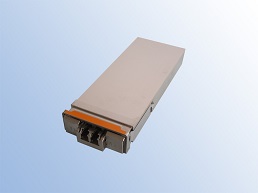Fujitsu Launches CFP2 ACO Transceiver for Beyond 100G Optical Networks
Key Features
- Compliant with OIF CFP2 ACO standard
This coherent transceiver has the same interface as the CFP2 MSA transceiver which is commonly used in 100G Ethernet applications and conforms to the OIF CFP2 ACO Class 1/Class 2 standards. The transceiver is compliant with the Class 2 standard and supports 16QAM transmission by using a linear modulator driver. - Uses in-house manufactured compact optical devices
An in-house manufactured compact semiconductor optical modulator and in-house integrated coherent receiver are used in the transceiver. FOC’s expertise in optical device control technology has enabled the module to remain highly stable across environmental changes. - Achievement of high optical output power
High density mounting and the use of circuit design technology that reduces the circuit scale enables us to mount an optical amplifier within the compact sized CFP2 transceiver. High optical output power of more than +1dBm was achieved with 16QAM modulation (which has a narrower modulation amplitude than QPSK modulation).
This includes development results by Photonics Electronics Technology Research Association (PETRA) with support from New Energy and Industrial Technology Development Organization (NEDO).
FOC plans to demonstrate this product in our booth (#1221) at OFC 2016 which is scheduled to take place from March 22 to 24 in Anaheim, California, USA.
Additional Information
- http://www.fujitsu.com/jp/foc/en/
Glossary & Notes
(*1) ACO: Acronym for Analog Coherent Optics
(*2) OIF: Acronym for Optical Internetworking Forum. The OIF is an organization that promotes standardization for the equipment and components used in optical networks.
(*3) An optical reference is combined with the incoming optical signal to produce an electrical signal out from the receiver. The waveform distortion that occurred in the optical transmission path is then compensated for by digital signal processing. This technique allows for significant reduction in system cost through the elimination of optical dispersion compensators and optical amplifiers (for loss compensation)
Contacts
Fujitsu Optical Components Limited
Sales & Business Promotion Division
Sales Promotion Department
![]() E-mail: foc-contact-pr@dl.jp.fujitsu.com
E-mail: foc-contact-pr@dl.jp.fujitsu.com
About Fujitsu Optical Components
Fujitsu Optical Components is a global leading supplier of the most advanced, high performance optical component solutions for high-speed optical networking applications including backbone networks, metro networks and data center. Our product line-up includes 100G Coherent Transceivers, 100G CFP/CFP2 Transceivers, 100G QSFP28 Transceivers, 100G/400G LN Modulators and 100G/400G Coherent Receivers. For additional information, visit http://www.fujitsu.com/jp/foc/en/.
All other company or product names mentioned herein are trademarks or registered trademarks of their respective owners. Information provided in this press release is accurate at time of publication and is subject to change without advance notice.
日付: 17 March, 2016

